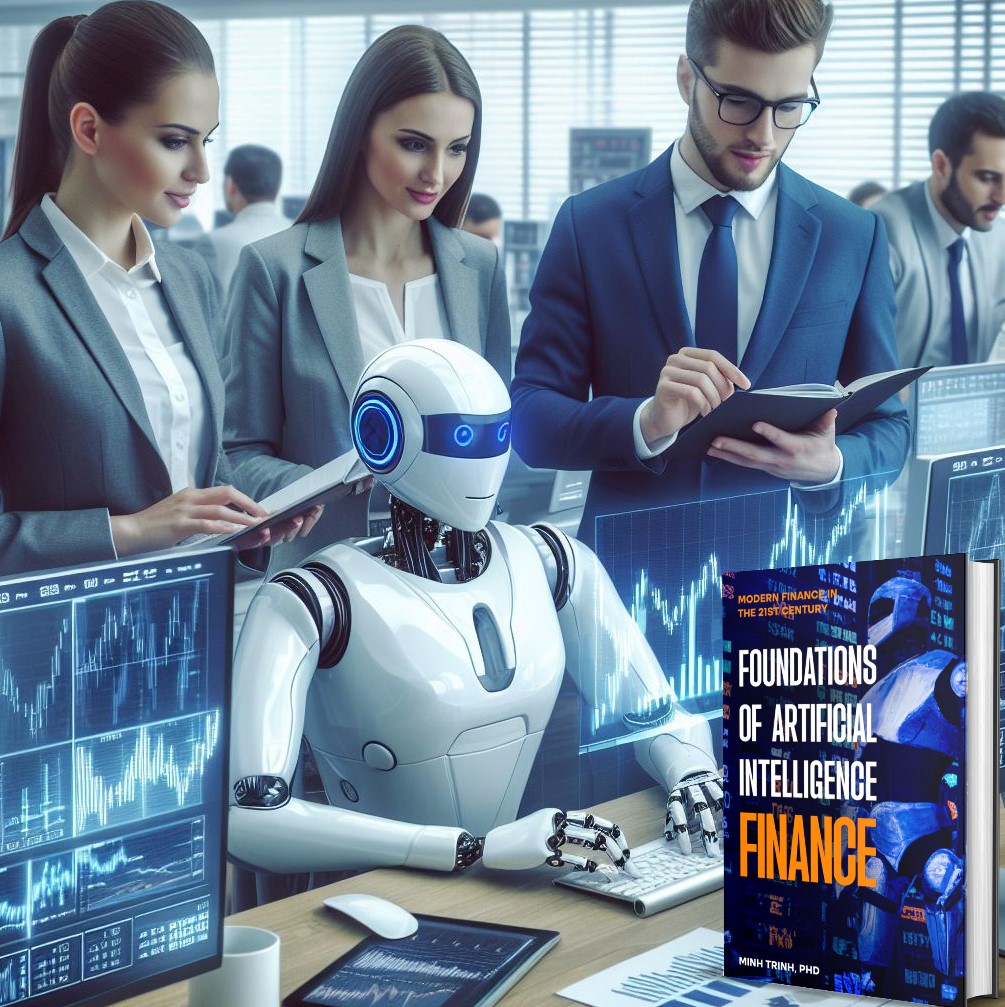
There are many outstanding questions in finance and insurance that artificial intelligence can help address. Some are described in the book Foundations of Artificial Intelligence Finance. These are some of them:

Investment Strategies and Markets:
The Future of Passive Investing: Will passive investing continue to dominate active management, or will there be a resurgence of alpha-generating strategies?
AI agents can play a significant role in the ongoing debate about the future of passive vs. active investing. Here’s how:
1. Enhancing Passive Investing:
- Advanced Indexing Strategies: AI agents can be used to develop more sophisticated indexing strategies that go beyond traditional market capitalization weighting. This could involve factors like profitability, quality, or momentum, potentially leading to even better passive fund performance.
- Risk Management and Optimization: AI agents can analyze vast amounts of market data to identify and manage risks associated with passive investing, such as sector concentration or overvaluation in certain areas. This allows for the creation of more robust and risk-adjusted passive investment products.
- Customized Passive Portfolios: AI agents can analyze an investor’s risk tolerance and financial goals to recommend personalized passive investment portfolios that cater to their specific needs.
2. Empowering Active Management:
- Alpha Generation through Alternative Data: AI agents can analyze vast datasets of “alternative data” like social media sentiment, satellite imagery, or web traffic data, potentially identifying hidden patterns and market inefficiencies that can be exploited for alpha generation.
- Sentiment Analysis and Market Prediction: AI agents can analyze news articles, social media, and financial reports to gauge market sentiment and predict potential market movements. This information can be used by active managers to make informed investment decisions.
- Portfolio Optimization and Stock Selection: AI agents can analyze vast amounts of financial data and company information to identify undervalued stocks or companies with high growth potential, assisting active managers in building and optimizing their portfolios.
3. Future Landscape:
- AI-Powered Hybrid Models: The future might see a rise in hybrid investment models that combine elements of both passive and active strategies. AI agents could help create these models by automatically allocating assets to passive and active components based on market conditions and investor goals.
- Democratization of Alpha: AI agents could potentially democratize alpha generation, making sophisticated investment strategies accessible to a wider range of investors, not just large institutions.
Impact Investing and ESG Integration: How can investors effectively measure the social and environmental impact of their investments, and how will ESG factors continue to influence investment decisions?
AI agents are becoming valuable tools for impact investors and those integrating ESG factors into their investment strategies. Here’s how AI can help answer this complex question:
1. Measuring Social and Environmental Impact:
- Data Gathering and Analysis: AI agents can gather and analyze vast amounts of data from diverse sources, including company reports, sustainability reports, NGO data, and satellite imagery. This allows for a more comprehensive assessment of a company’s social and environmental impact.
- Impact Measurement Frameworks: AI agents can be used to develop and apply standardized impact measurement frameworks. This helps investors compare the social and environmental impact of different investments across sectors.
- Impact Prediction and Portfolio Optimization: AI agents can be trained to predict the potential social and environmental impact of future investments. This allows investors to optimize their portfolios based on both financial and impact goals.
2. Understanding ESG Factors:
- Identifying Material ESG Risks and Opportunities: AI agents can analyze large datasets of financial and non-financial data to identify ESG factors that are material to a company’s long-term financial performance. This helps investors make informed decisions about potential risks and opportunities associated with ESG factors.
- ESG Data Integration and Portfolio Analysis: AI agents can integrate ESG data with traditional financial data to create a holistic view of a company’s risk-return profile. This allows investors to consider both financial and ESG factors when making investment decisions.
- Scenario Analysis and Stress Testing: AI agents can be used to conduct scenario analysis and stress testing on portfolios, considering the potential impact of future climate change regulations, social unrest, or resource scarcity. This helps investors build more resilient portfolios.

Cryptocurrency’s Role in Investing: Will cryptocurrencies become a mainstream asset class, or will regulatory uncertainty and volatility limit their long-term viability?
AI agents are playing an increasingly important role in the cryptocurrency space, and can offer valuable insights into the question of whether cryptocurrencies will become mainstream or remain limited by volatility and regulation. Here’s how:
1. Understanding Market Dynamics and Predicting Trends:
- Market Analysis and Sentiment Tracking: AI agents can analyze vast amounts of trading data, social media sentiment, and news articles to identify trends and potential shifts in the cryptocurrency market. This can help investors gauge market confidence and make informed decisions.
- Volatility Prediction: AI agents can be trained on historical data to predict potential price fluctuations in cryptocurrencies. While not foolproof, this can help investors manage risk and identify potential entry and exit points.
- Network Analysis and On-Chain Data Exploration: AI agents can analyze blockchain data (on-chain data) to understand network activity, transaction volume, and user behavior within specific crypto ecosystems. This can provide insights into the health and potential growth of a cryptocurrency.
2. Regulatory Landscape and Risk Assessment:
- Regulatory Risk Analysis: AI agents can analyze legal documents and regulatory pronouncements to assess the potential impact of new regulations on different cryptocurrencies. This helps investors understand potential risks and opportunities in a constantly evolving regulatory environment.
- Compliance Management: AI agents can automate compliance tasks for cryptocurrency exchanges and investment firms, ensuring adherence to anti-money laundering (AML) and know-your-customer (KYC) regulations.

The Next Financial Crisis: What factors could trigger the next financial crisis, and how will it differ from previous crises?
AI agents are becoming increasingly sophisticated tools for financial risk assessment, and can be valuable assets in understanding the next potential financial crisis. Here’s how AI can help us identify triggers and potential differences from past crises:
Identifying Early Warning Signs:
- Analyzing Market Data and Identifying Anomalies: AI agents can analyze vast amounts of financial data, including stock prices, bond yields, credit spreads, and economic indicators, to identify unusual patterns and potential imbalances that might signal an impending crisis.
- Stress Testing and Scenario Modeling: AI agents can be used to conduct stress tests on financial systems by simulating different economic shocks, such as interest rate hikes, asset price bubbles, or geopolitical events. This helps assess vulnerabilities and potential tipping points.
- Social Media Sentiment Analysis: AI agents can analyze social media sentiment and news articles to gauge investor confidence and identify potential signs of fear or exuberance in the market, which can contribute to crisis build-up.
Understanding Potential Triggers:
- Hidden Risks and Interconnectedness: The financial system is complex and interconnected. AI agents can analyze vast datasets to identify hidden risks and potential domino effects that could trigger a crisis, even from seemingly unrelated sectors.
- Cybersecurity Threats and Systemic Risks: AI agents can be used to assess the potential impact of cyberattacks on financial institutions and critical infrastructure. This can help identify vulnerabilities and build resilience against cyber threats that could trigger a crisis.
- Geopolitical and Climate Risks: AI agents can analyze geopolitical tensions and climate change data to assess their potential impact on financial markets. This can help identify potential triggers arising from external factors.
How the Next Crisis Might Differ:
- Role of Technology and Innovation: The financial system is constantly evolving, with new technologies like cryptocurrencies and decentralized finance (DeFi) emerging. AI agents can help assess the potential risks and vulnerabilities associated with these innovations and how they might contribute to or differ from past crises.
- Globalized and Interconnected Markets: Financial markets are more interconnected than ever. AI agents can help model how a crisis in one region might cascade and impact other parts of the world, potentially leading to a more globalized financial crisis.
- The Rise of Algorithmic Trading: The increasing use of algorithmic trading can amplify market movements. AI agents can analyze the behavior of trading algorithms and assess their potential role in exacerbating a crisis or creating new unforeseen risks.
There many other questions that AI agents can address in finance and insurance:
Financial Stability and Regulation:
- Central Bank Digital Currencies (CBDCs): How will CBDCs impact the financial system, and what are the potential risks and benefits for investors and consumers?
- Debt Levels and Financial Fragility: How can we address rising global debt levels and prevent future financial instability?
- Regulation of Fintech and Shadow Banking: How should regulators balance innovation and risk mitigation in the rapidly evolving fintech and shadow banking sectors?
- Cybersecurity Threats: How can financial institutions protect themselves from increasingly sophisticated cyber threats?
- Income Inequality and Wealth Distribution: How can we address rising income inequality and ensure financial stability for all segments of society?
Retirement and Risk Management:
- Sustainability of Social Security and Pensions: How can we ensure the long-term sustainability of social security and pension systems in the face of demographic changes and rising healthcare costs?
- The Long-Term Care Challenge: How can we develop affordable and accessible long-term care solutions for an aging population?
- Cybersecurity and Insurance: How can insurance companies keep pace with evolving cyber threats and provide adequate coverage for businesses and individuals?
- Climate Change and Insurance Risk: How will climate change impact insurance pricing and availability, particularly for property and casualty insurance?
- Behavioral Finance and Decision-Making: Can a better understanding of behavioral biases improve financial decision-making by individuals and institutions?
Emerging Trends and Challenges:
- Financial Inclusion for the Underbanked: How can we expand access to financial services for the underbanked population around the world?
- The Future of Work and Retirement Planning: How will the changing nature of work impact traditional retirement planning models?
- Financial Literacy and Education: How can we equip individuals with the financial literacy they need to make informed financial decisions?
- The Rise of Robo-Advisors: Will robo-advisors become the dominant force in wealth management, or will there be a continued role for human advisors?
- Ethical Investing and Stakeholder Capitalism: How can financial institutions integrate stakeholder considerations into their investment strategies and decision-making processes?
One mission of Centaurs Fabs is to develop AI Agents that can assist finance professionals to address these difficult but important questions.

